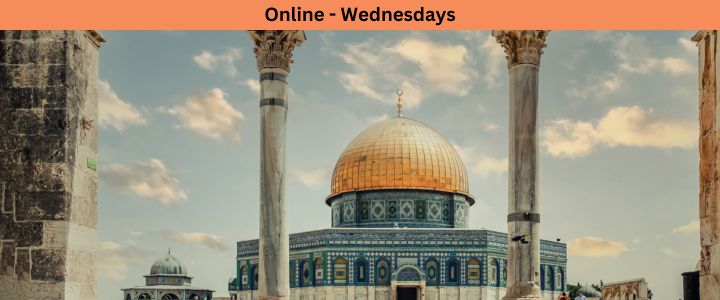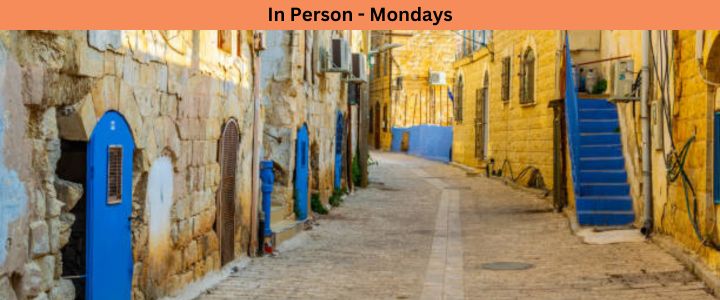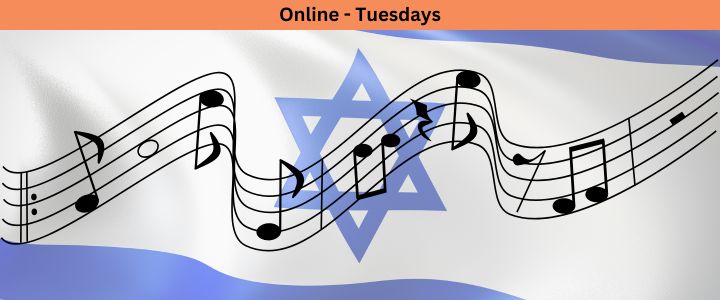
Does G-d Have a Body?
Program: Open Circle Jewish Learning, Text and Tradition
Instructor: Sara Klugman
Dates: 5 Sundays, 6/16, 6/23 & 6/30, 7/7, 7/14, 2024
Time: 4-5:30 p.m. EST
Course fee: $200, financial aid is available
Location: Zoom
Hosted by: Hebrew College
What does our tradition teach us about G-d’s body? Does G-d have a body, multiple bodies, or no body at all? What are the beliefs and contradictions, in Jewish theologies of the divine body? In this class, we will look at these questions across the prism of ancient, medieval, and contemporary Jewish thought. In addition to ancient and rabbinic texts, we will draw on philosophical texts, modern literature and poetry, visual art & media, and contemporary cultural critique. We will also explore how we might take the learning we do in class into our spiritual practice.
Hebrew College Open Circle Jewish Learning is for learners of all backgrounds.
Canadian and other registrants from outside of the US: please email Cindy Bernstein to complete your registration. We apologize for the inconvenience.

Lethal Literature: Wrestling with the Dark Side of Jewish Text
Program: Open Circle Jewish Learning, Text and Tradition
Instructor: Aron Wander
Dates: 5 Sundays, 7/28, 8/4, 8/11, 8/25 & 9/8
Time: 10-11:30 a.m. EST
Course fee: $200, financial aid is available
Location: Zoom
This class is offered in partnership with Temple Israel Boston
How do we engage with the disturbing, upsetting, or even horrifying parts of Jewish tradition? What resources are there within Judaism itself for navigating this question?
In “Lethal Literature,” we’ll take a deep dive into a puzzling Talmudic text in which the rabbis express their own discomfort with the Torah. They take three Biblical passages – a legal case in which parents condemn their child to death, the command to slaughter the inhabitants of an idolatrous city, and a description of God enacting a plague seemingly without reason – and claim that each of them is purely theoretical. Each one, they insist, “never happened and never will happen.”
We’ll begin by analyzing those three Biblical passages, and then we’ll see how the rabbis rewrite, reinterpret, and reimagine them. After, we’ll turn to medieval and contemporary commentaries on that Talmudic discussion that use it as a lens through which to explore deeper and broader inquiries about the morality – or immorality – of Jewish text and tradition. What insights might all of those texts and commentaries have for us as we wrestle with our own urgent moral questions, challenges vis-à-vis Judaism, and fears in the face of a world on fire?
Hebrew College Open Circle Jewish Learning is for learners of all backgrounds.
Canadian and other registrants from outside of the US: please email Cindy Bernstein to complete your registration. We apologize for the inconvenience.

Talmudic Tales: Crisis, Calamity, and Survival
Program: Hebrew College Me’ah Select
Instructor: Rabbi Neal Gold (Read Bio)
Dates: 4 Wednesdays, 7/31, 8/7, 8/14 & 8/21
Time: 9:30-11:30 a.m. EST
Course fee: $200, financial aid is available
Location: Zoom
Hosted by: Hebrew College
The stories of the Sages of the Talmud have the ability to surprise, delight, and teach profound lessons about life and survival. In this course, we’ll explore some of the richest tales and their lessons for our current moment of struggle and tragedy. In the shadow of the nightmare of Oct. 7, the war against Hamas, and surging antisemitism we will look at aggadot/Talmudic stories that address how the Sages navigate moments of crisis and tragedy. We’ll look at the primary sources, in translation, from the Talmud, with appropriate contextual and background readings.
For more information, contact meah@hebrewcollege.edu

The Islamic Perspective on Jews and Judaism
Program: Hebrew College Me’ah Select
Instructor: Dr. Shari Lowin (Read Bio)
Dates: 6 Wednesdays, 6/5, 6/26, 7/3, 7/10, 7/17 & 7/24
Time: 9:30-11:30 a.m. EST
Course fee: $300, financial aid is available
Location: Zoom
Hosted by: Hebrew College
Much of what we know today about how Islam views Jews and Judaism comes from news sources reporting from areas of conflict. But what does Islam really have to say about Jews and Judaism? In this 6-week course, we will investigate the Muslim attitude toward and depiction of Jews and Judaism, starting from the Qur’an itself. We will look at the relationship between Muhammad and the Jews of Medina; the portrayal of Jews in the classical and later Islamic sources; and, Islamic legal rulings on Jews and Judaism.
For more information, contact meah@hebrewcollege.edu

From Trauma to Triumph:
The 16th Century Jewish Renaissance of Tsfat
Program: Hebrew College Me’ah Select
Instructor: Rabbi Benjamin Samuels (Read Bio)
Dates: 6 Mondays, 6/17, 6/24, 7/1, 7/8, 7/15 & 7/22
Time: 9:30-11:30 a.m. EST
Course fee: $300, financial aid is available
Location: In Person at Hebrew College
Hosted by: Hebrew College
At times of crisis, we look for models of resiliency. One such exemplar can be found in 16th century Tzfat, a hillside city in the Upper Galilee of the Land of Israel. In the aftermath of the Spanish Expulsion in 1492, after the Ottomans began to rule the land, a small group of elite scholars endeavored to transmute Jewish national trauma into triumph through an extraordinary spiritual and scholarly renaissance. They aspired to apprehend the mind of God and the medium of God’s involvement in the world through a revolution in mystical understanding (Lurianic Kabbalah). They sought to unify world Jewry and advance the ultimate redemption through the restoration of authentic rabbinic ordination (the Semikha Controversy) and legal codification (Shulkhan Arukh). Through their intense spiritual yearnings and evocative poetry, they inaugurated liturgical and ritual change (our Friday night “Kabbalat Shabbat” service). They wrote biblical and talmudic commentary, moral codes, spiritual diaries, and transmitted oral narratives. In this six-session series, we will study this elite scholar circle, their historical circumstances, spiritual achievements, and enduring legacy. Perhaps we will find in their inspiring model Jewish pathways to redeem our own current Jewish traumas with Jewish renaissance.
For more information, contact meah@hebrewcollege.edu

The Soundtrack of Zionism
Program: Hebrew College Me’ah Select
Instructor: Dr. Joshua Jacobson (Read Bio)
Dates: 6 Tuesdays, 6/4, 6/11, 6/25, 7/2, 7/9 & 7/23
Time: 9:30-11:30 a.m. EST
Course fee: $300, financial aid is available
Location: Online
Hosted by: Hebrew College
In six presentations with recordings and videos we will see and hear how songs from the Land of Israel reflected the changing character of its population. We will study the origins of popular and political songs from the birth of “Hava Nagila” and “Hatikvah” more than a century ago through the hits of the 21st century and musical reactions to October 7.
For more information, contact meah@hebrewcollege.edu







